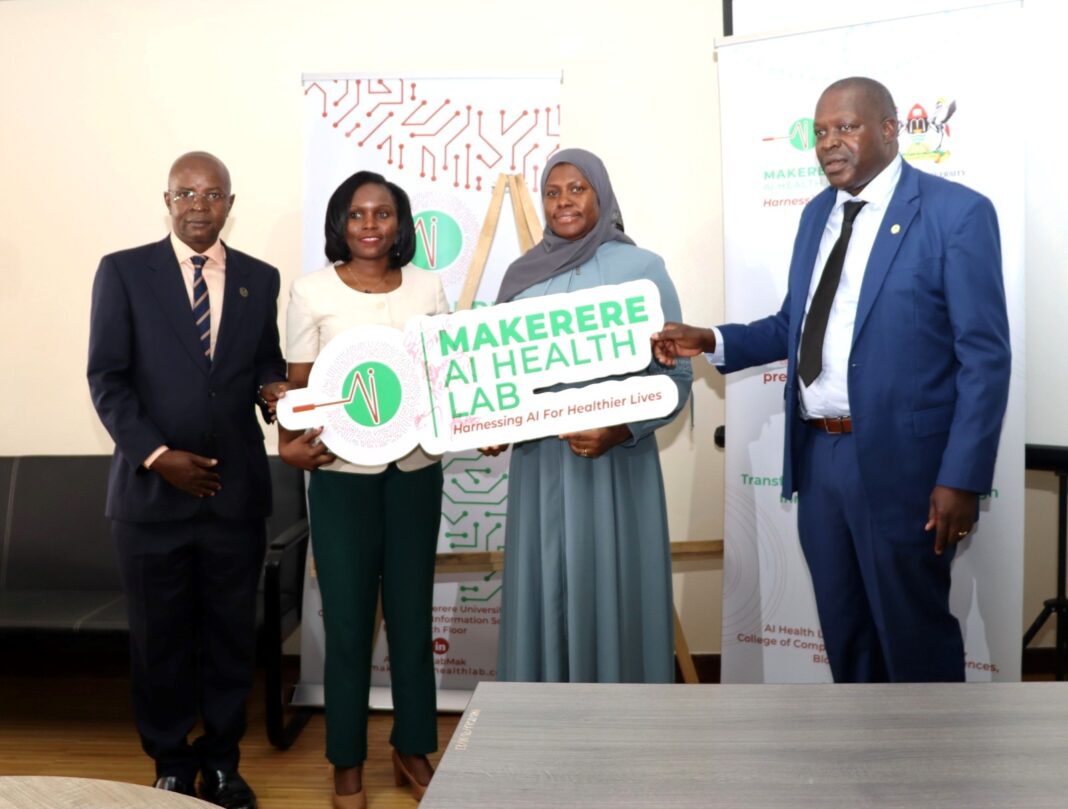The Ugandan Government, in collaboration with Makerere University, has inaugurated the Artificial Intelligence Health Lab. This pioneering initiative aims to revolutionise healthcare delivery using artificial intelligence (AI), marking a crucial advancement for the nation. The lab is situated in Block B, College of Computing and Information Sciences.
Launching the lab, the Permanent Secretary of the Ministry of ICT and National Guidance, Dr Aminah Zawedde, underscored the importance of this development. “Today marks a momentous occasion as we unveil the Artificial Intelligence Health Lab at Makerere University. This milestone signifies not just a step forward for the university but for our entire nation as we enter an era of innovation and advancement in healthcare through artificial intelligence,” she remarked.
Dr Zawedde highlighted the transformative power of AI in healthcare, noting its potential to revolutionise diagnostics, treatment plans, and personalised care. She acknowledged the government’s ongoing efforts to integrate AI into healthcare through initiatives like telemedicine platforms, health data analytics, and AI-driven solutions in medical imaging and drug discovery.
However, she stressed the need for ethical and responsible AI deployment, addressing algorithmic biases, patient privacy, and equitable distribution of AI benefits.
“The Ministry of ICT & National Guidance is committed to supporting AI adoption in healthcare through policy guidance, financial support, capacity building, and infrastructure development,” Dr Zawedde stated. She called for collaboration among government agencies, academia, healthcare providers, and technology partners to advance AI initiatives responsibly.
Dr Aminah Zawedde emphasised the importance of prioritising locally developed solutions to better understand and effectively address national challenges. She outlined five key priorities for Uganda’s digital transition, focusing on infrastructure, accessibility, digital services, cybersecurity, data protection, privacy, digital skilling, and innovation.
Regarding infrastructure and connectivity, the government aims to expand coverage to 70% of the country within the next five years, with ongoing projects supported by the World Bank and China. This initiative targets essential institutions like schools, hospitals, administrative offices, and innovation hubs.
Ensuring the accessibility of gadgets, particularly smartphones, is another critical focus area. Recognising the importance of these devices for accessing digital technologies and apps, efforts are underway to lower costs through measures such as tax waivers and local manufacturing.
Additionally, the government is prioritising the transition of services online to enhance efficiency, transparency, accountability, and ease of doing business. This move aligns with existing regulations and guidelines for digital transformation, with an emphasis on overcoming implementation challenges related to financial resources, capacity, and awareness creation.
Cybersecurity, data protection, and privacy are also paramount, with plans to develop trusted systems to safeguard digital infrastructure and user information. Furthermore, digital skilling initiatives aim to equip end-users and office management with the necessary skills for effective digital operations.
Finally, the government emphasises innovation and entrepreneurship, celebrating community-driven solutions that are sustainable, acceptable, and impactful. This focus underscores the commitment to fostering a thriving ecosystem of innovation that addresses the needs of Ugandan society.
Dr Myers Lugemwa from the National Malaria Control Program presented a compelling case for the integration of artificial intelligence (AI) tools in Uganda’s healthcare system. Addressing the current health challenges and the potential of AI, Dr Lugemwa underscored the transformative impact these technologies could have on disease diagnosis and management.
Dr Lugemwa highlighted the promise of Makerere University’s AI Health Lab in addressing these diagnostic challenges. “AI tools could revolutionise the accuracy and accessibility of disease diagnosis,” he said. “From improving malaria diagnostics to streamlining cancer screening and diagnosis, AI has the potential to transform healthcare delivery in Uganda.”
Furthermore, Dr Lugemwa discussed the role of AI in predicting disease patterns affected by climate change, such as malaria, and the importance of electronic health records (EHRs) in improving patient management and healthcare delivery.
“In summary, the AI Health Lab is poised to be a game-changer for Uganda’s healthcare system,” Dr Lugemwa emphasised. “It aligns with Makerere University’s mission to ‘Build For the Future’ and addresses the Alma-Ata Declaration’s call for local tools that are readily available, accessible, affordable, and user-friendly. The integration of AI in healthcare is not just a technological advancement but a critical necessity for improving health outcomes in Uganda.”
Representing Makerere University’s Vice Chancellor, Prof Edward Bbaale, Director of the Directorate of Graduate Research and Training, expressed pride in the university’s achievements. He underscored Makerere’s proactive steps in promoting AI, including establishing dedicated AI labs, integrating AI courses into the curriculum, and fostering partnerships.
Makerere University’s AI Lab is embarking on an ambitious journey to revolutionise healthcare through advanced artificial intelligence (AI) technologies. Dr Rose Nakasi, the project leader, unveiled the lab’s comprehensive strategy aimed at addressing critical health challenges and improving patient outcomes through innovative AI solutions and interdisciplinary collaboration.
Among the key projects highlighted by Dr Nakasi is the Ocular Project, a decision support tool designed to reduce diagnosis time and improve accuracy. Supported by a recent $1.5 million grant from Google, this project aims to automate diagnoses for diseases such as Malaria, Tuberculosis, and Cervical Cancer. Additionally, the DS Malaria project focuses on in-field automated screening trials to enhance malaria diagnosis, while initiatives like curating datasets for malaria diagnostics and digital Pap smear images aim to improve the accuracy and efficiency of disease screening.
Looking ahead, Dr Nakasi outlined the lab’s vision for continued innovation and growth, including addressing challenges in the health sector and collaborating with regulators to refine and develop new approaches for healthcare needs. She highlighted the lab’s commitment to nurturing the next generation of AI and healthcare experts, with a growing team of PhD and master’s students.


